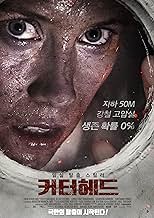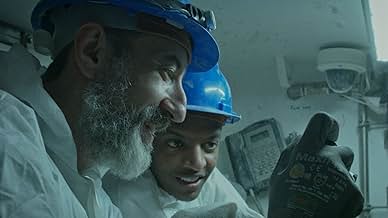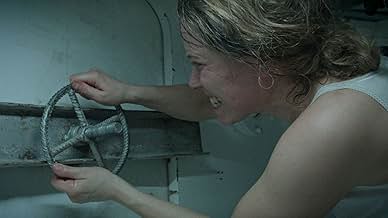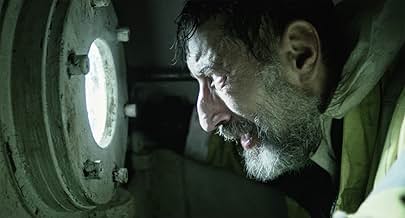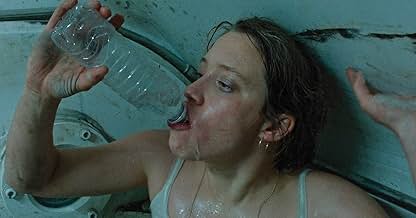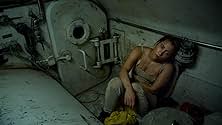Rie visits a tunnel-boring machine being used to construct the Copenhagen Metro. When an accident occurs, she must survive the claustrophobic conditions of an airlock with Ivo and Bharan whi... Read allRie visits a tunnel-boring machine being used to construct the Copenhagen Metro. When an accident occurs, she must survive the claustrophobic conditions of an airlock with Ivo and Bharan whilst reconsidering their lives.Rie visits a tunnel-boring machine being used to construct the Copenhagen Metro. When an accident occurs, she must survive the claustrophobic conditions of an airlock with Ivo and Bharan whilst reconsidering their lives.
- Director
- Writers
- Stars
- Awards
- 6 wins & 16 nominations total
- Director
- Writers
- All cast & crew
- Production, box office & more at IMDbPro
Featured reviews
Saw this at the Brussels International Fantastic Film Festival 2019 (BIFFF for intimates). It is not a Horror or Thriller in the standard sense: no squeaking doors, no jump scares, no suddenly appearing ghosts, none of those clichés. Its tense may be felt nevertheless. We are constantly unsure how this story will end, given the deadly dangers awaiting the threesome we follow underground when disaster strikes.
Nice view on building operations underground, in this case construction works for the Copenhagen Metro. The setup looks like an organized chaos, but that is only the first impression and very unjust. These people know what they do, even when things go terribly wrong. And if all else fails, they can also count on salvage procedures and rescue teams. Panic and hasty decisions are out of the question, as theses are mostly counter productive.
Rie, our resident reporter, however, detests waiting for a rescue team. She wants action, even when it is risky, or when it violates regulations and safety procedures. She also goes against technical knowledge her fellow victims have, just wanting to do "something". She even lies about wanting to pee and needing some privacy, when in fact she prepares herself (out of sight) for an action the others would frown upon had they known her intentions.
Being there for PR purposes only, Rie's presence as a guest may be a nuisance, but she is a perfect vehicle for telling the story and following its developments from nearby. It gives us ample chance to understand why some things are done the way they are done in a working environment that we seldom get to see. As such, the screenplay is a success and seems the best (even the only??) way to sustain the story for one and a half hour, without risking to bore us. It clearly showcases the differences between people in Denmark, with Rie as piece de resistance in this movie, and the underground workers of all sorts of nationalities, who are there as the work pays very well (relative in their own country) and take the disadvantages (far away from family, problems with the language, risky and dirty working conditions) in addition and as inevitable.
Nice view on building operations underground, in this case construction works for the Copenhagen Metro. The setup looks like an organized chaos, but that is only the first impression and very unjust. These people know what they do, even when things go terribly wrong. And if all else fails, they can also count on salvage procedures and rescue teams. Panic and hasty decisions are out of the question, as theses are mostly counter productive.
Rie, our resident reporter, however, detests waiting for a rescue team. She wants action, even when it is risky, or when it violates regulations and safety procedures. She also goes against technical knowledge her fellow victims have, just wanting to do "something". She even lies about wanting to pee and needing some privacy, when in fact she prepares herself (out of sight) for an action the others would frown upon had they known her intentions.
Being there for PR purposes only, Rie's presence as a guest may be a nuisance, but she is a perfect vehicle for telling the story and following its developments from nearby. It gives us ample chance to understand why some things are done the way they are done in a working environment that we seldom get to see. As such, the screenplay is a success and seems the best (even the only??) way to sustain the story for one and a half hour, without risking to bore us. It clearly showcases the differences between people in Denmark, with Rie as piece de resistance in this movie, and the underground workers of all sorts of nationalities, who are there as the work pays very well (relative in their own country) and take the disadvantages (far away from family, problems with the language, risky and dirty working conditions) in addition and as inevitable.
Danish novice writer/director Rasmus Kloster Bro makes his first full length feature film debut, and does pretty good.
Decent story - screenplay could have been a little tighter, the directing/camera work not bad at all for working with confined spaces - especially towards the end. Sound was a little off - could hear more equipment sounds than the dialogue. Length and pacing was perfect, with non-stop suspense in the last three quarters.
A solid 7/10 from me
Decent story - screenplay could have been a little tighter, the directing/camera work not bad at all for working with confined spaces - especially towards the end. Sound was a little off - could hear more equipment sounds than the dialogue. Length and pacing was perfect, with non-stop suspense in the last three quarters.
A solid 7/10 from me
Despair. Madness. Fear. Panic.
These are the feelings that would surface if I were in a similar situation. This story is the kind of thing you read about in the news when workers become trapped underground, with their workplace becoming their tomb. I ask myself: how horrible can the situation become for these people? The answer: pretty damn horrible.
These are the feelings that would surface if I were in a similar situation. This story is the kind of thing you read about in the news when workers become trapped underground, with their workplace becoming their tomb. I ask myself: how horrible can the situation become for these people? The answer: pretty damn horrible.
When I first started watching this the photography quality and overall impression was one of "oh no this looks like a BBC docudrama" but my fears were soon quashed as it turns out this is a rather unique and really quite interesting adventure into the realms of human frailty and if you suffer from fear of small spaces I would issue a warning on this film as it presents quite a realistic claustrophobic atmosphere especially in the closing 30 minutes.
It is not a crash, bang, wallop movie with oodles of CGI and action and 5 star actors but it is more of a study of human frailty when confronted by disaster and it does it in quite a more honest way than most movies have in the past and is down and dirty with no frills or spills. I fear most people will find it tedious but give it a chance and watch it to the end and you might just be surprised.
It is not a crash, bang, wallop movie with oodles of CGI and action and 5 star actors but it is more of a study of human frailty when confronted by disaster and it does it in quite a more honest way than most movies have in the past and is down and dirty with no frills or spills. I fear most people will find it tedious but give it a chance and watch it to the end and you might just be surprised.
In the opening scene of Cutterhead, as protagonist Rie rides a construction site elevator deep into the Danish underground, we glimpse the elevator's control panel and its "up" and "down" buttons that some joker has labeled "Heaven" and "Hell" in felt pen, setting the stage for the claustrophobic horror that's to come.
As a copywriter for the Copenhagen metro, she's there to write the kind of breezy PR texts that might excitedly describe the metro as "the largest construction project in the Danish capital in 400 years", and frame having workers of 24 different nationalities as a "great European coming together" (rather than the result of working conditions and pay that no Danish construction worker would accept). Her interviewees aren't playing along, though. "What's the best part of your job?" she asks every worker she approaches, but most give polite non-answers (clearly trying to avoid trouble), if they even speak English. Only Ivo, who's from Croatia and maintains the cutterhead, doesn't hesitate. "The money," he answers, dispelling any romantic notions of a labor of love.
These workers are all here, working a bad job with bad pay and bad working conditions, because they need the money. But why is Rie here? The question lingers throughout the movie. When one character questions if she's even allowed, Ivo explains "She's from the office". In other words, she's Danish. "I have permission to go anywhere", Rie helpfully adds.
Ivo and his colleague Bharan work the cutterhead because it's more dangerous, and hence pays more. Even then, Rie undoubtedly earns more than either of them. The disaster that soon engulfs these three people should erase these differences, but the sense of disparity persists, and it's in these clashes between worlds that Cutterhead becomes more than a disaster movie with a novel setting, and shows real bite with its social critique.
As a copywriter for the Copenhagen metro, she's there to write the kind of breezy PR texts that might excitedly describe the metro as "the largest construction project in the Danish capital in 400 years", and frame having workers of 24 different nationalities as a "great European coming together" (rather than the result of working conditions and pay that no Danish construction worker would accept). Her interviewees aren't playing along, though. "What's the best part of your job?" she asks every worker she approaches, but most give polite non-answers (clearly trying to avoid trouble), if they even speak English. Only Ivo, who's from Croatia and maintains the cutterhead, doesn't hesitate. "The money," he answers, dispelling any romantic notions of a labor of love.
These workers are all here, working a bad job with bad pay and bad working conditions, because they need the money. But why is Rie here? The question lingers throughout the movie. When one character questions if she's even allowed, Ivo explains "She's from the office". In other words, she's Danish. "I have permission to go anywhere", Rie helpfully adds.
Ivo and his colleague Bharan work the cutterhead because it's more dangerous, and hence pays more. Even then, Rie undoubtedly earns more than either of them. The disaster that soon engulfs these three people should erase these differences, but the sense of disparity persists, and it's in these clashes between worlds that Cutterhead becomes more than a disaster movie with a novel setting, and shows real bite with its social critique.
Did you know
- TriviaThe film was edited using method-editing in a very small, dark and extremely hot editing suite called "Slum Suiten".
- How long is Cutterhead?Powered by Alexa
Details
Box office
- Budget
- DKK 4,300,000 (estimated)
- Runtime
- 1h 24m(84 min)
- Color
- Aspect ratio
- 1.85 : 1
Contribute to this page
Suggest an edit or add missing content

